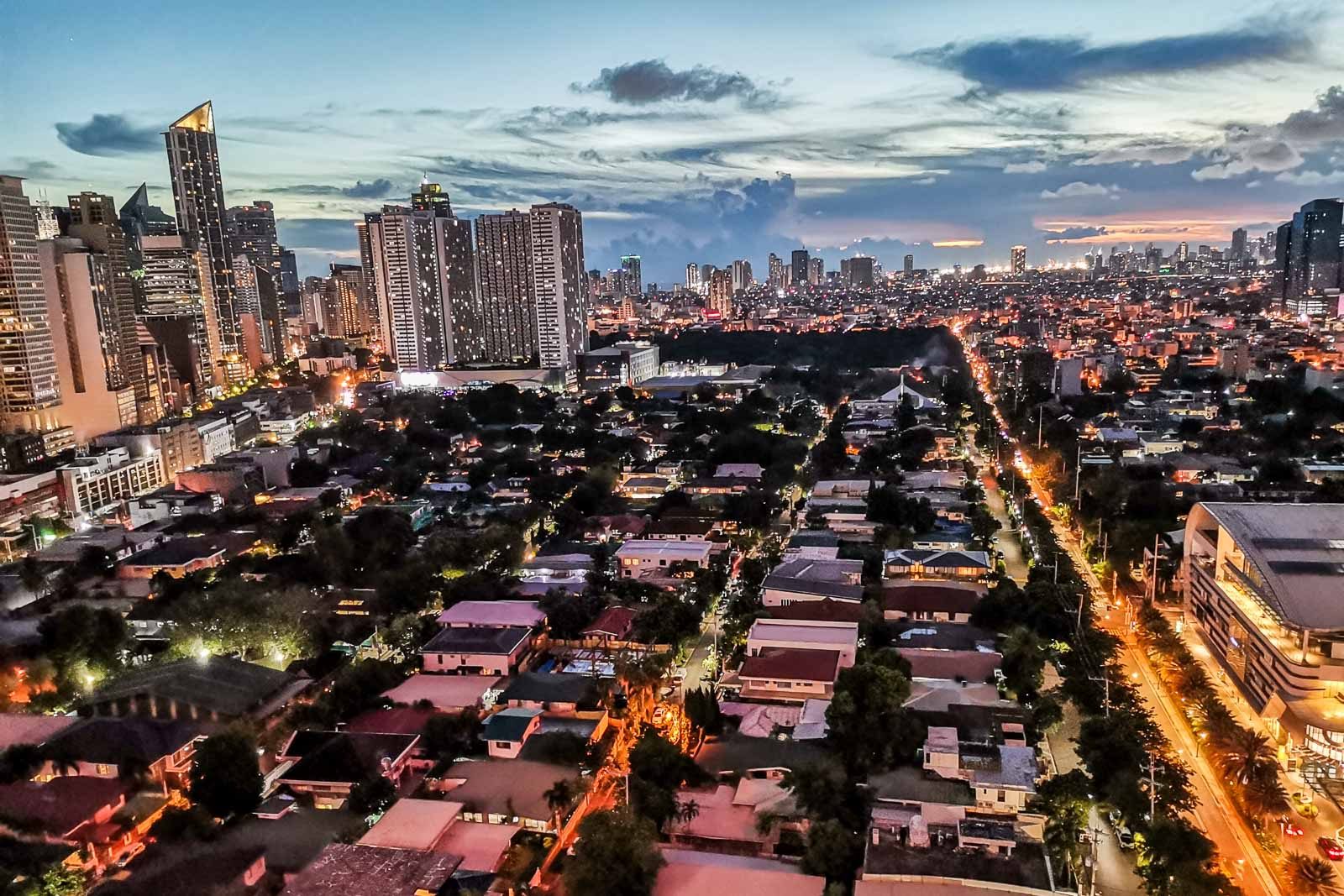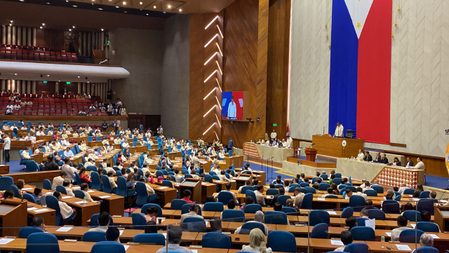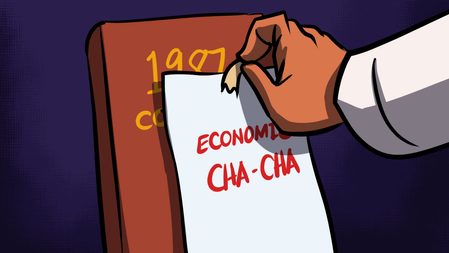SUMMARY
This is AI generated summarization, which may have errors. For context, always refer to the full article.

MANILA, Philippines – Lawmakers are laying the groundwork for one of the most divisive means to supposedly rev up the country’s tepid economy.
So far, CEOs and tycoons themselves have yet to speak up on the most recent moves to amend the Constitution via people’s initiative.
In general, past statements of business groups reveal that they have always been open to the idea, citing the Constitution’s explicitly strict limitations that hinder the economy. But at the same time, CEOs have acknowledged that timing is important as well.
Here’s a summary of business groups’ statements on tweaking the Constitution since 2013.
When is the best time?
Previous joint statements of business groups show that they value timing.
The MBC and other business groups welcomed talks of amending the Constitution during non-election years.
In 2013, midway through the Aquino administration, there were ongoing talks about relaxing foreign equity participation and land ownership. The Makati Business Club (MBC) and other business groups said that it was “imperative” that the government took advantage of the “narrow window” to amend portions of the Constitution.
In January 2018 – midterm of the Duterte administration – the MBC said that was the best time to revive charter change talks.
“[I]t is our strong position that there is no better time than now to begin the process of updating the outdated economic restrictions in our Constitution. The Philippines has enjoyed enhanced growth prospects and is on the radar screen of the international investment community – and these will be further improved by higher foreign investments coupled with improved environment in doing business in the country,” MBC said then.
But in a statement in January 2021, the Makati Business Club (MBC) and 12 other groups strongly opposed moves to amend the Constitution. At the time, the presidential election was just 15 months away. The revived bid raised concerns that amendments related to term limits would also be introduced.
The business groups, at that time, recommended that elected officials initiate steps for constitutional amendments within 12 months after the elections.
Zobel, Razon’s past statements
It’s rare for tycoons to speak up on political matters. But in a forum by Stratbase ADR institute in December 2016, or just six months into the Duterte administration, Jaime Augusto Zobel de Ayala and Enrique Razon expressed support for constitutional amendments.
“We should do what is good for the country and I think an open environment for investment is good for the country and I think there are limitations in our Constitution that make foreign investments uncomfortable. We should release those clauses and allow those people to come in and invest,” said Zobel, who was quoted by the Philippine Star.
Meanwhile, Razon was more frank, noting that the Constitution should be changed often.
“What’s so great about the Constitution anyway? I think we should change it all the time, change it every five years or change it every three years. It’s a piece of paper and what’s the use of it if you don’t follow the laws. We should change it every five years. It’s just a document,” Razon said then.
How lawmakers should do it
Over the years, business groups were consistent that they wanted the two chambers of Congress to vote separately on constitutional amendments.
In 2018, MBC said that separate voting secures the autonomy of the Senate and avoids “diluting the voice” of senators in such a “critical process.”
“We understand this to be the intention of the framers of the 1987 Constitution and this is also consistent with the legislative process. The proposed amendments shall then be presented and discussed with the public before seeking approval via nationwide plebiscite,” the MBC said in 2018.
‘Unless otherwise provided by law’
A key provision that is being studied in the latest iteration of charter change is the proposed inclusion of “unless otherwise provided by law” in certain provisions pertaining to foreign ownership. This effectively eases the Constitution and gives new laws much leeway to define ownership restrictions.
In December 2013, under the Benigno Aquino III administration, the MBC and other business groups supported a similar measure pushed by then-speaker Feliciano Belmonte Jr.
“We believe that this proposal – for the House and the Senate to surgically amend the restrictive economic provisions by inserting the phrase ‘unless otherwise provided by law’…. is a safe, streamlined, and effective way of pursuing this most significant undertaking. Let us set this initiative in motion now and ensure that our country does not miss the boat to national competitiveness and progress,” the statement read.
The MBC went on to emphasize that such inclusion would have to be endorsed by three-fourths of each chamber, get approval from the public through a plebiscite, then have specific laws passed.
The group issued a similar statement in 2018, supporting the inclusion of the phrase.
But in January 2021, the Philippine Chamber of Commerce and Industry (PCCI) cautioned that such insertion would weaken the Constitution.
“While it may be the fastest option, inserting the provision ‘unless otherwise provided by law’ in sections of the Constitution that limit foreign equity to 40% in business ventures that are considered of critical interest to the Filipino people, could potentially weaken the country’s highest law by making it easier for ordinary legislation to amend the Constitution,” PCCI said.
Meanwhile, the Management Association of the Philippines proposed the deletion of the phrase “effectively controlled by Filipinos” in Article II, Section 19, and to replace it with the phrase “consistent with its regional and international commitments.”
Perks of opening up the economy
Business groups have always been supportive of easing economic provisions of the Constitution.
Business groups described the Constitution as “too detailed” and “too restrictive” to “cater to the changing needs and challenges of market fluctuations.”
Here are some of the main themes from statements made in the past decade:
- Granting foreigners greater access to our economy does not equate the diminution of Filipinos’ sovereign rights and the deprivation of economic opportunities for our people.
- In almost all countries in the world, economic restrictions on foreign investment are not contained in their imposing restrictions on foreign trade, and investments are done through legislation or administrative orders that can be changed to suit shifting national priorities.
- Much has changed in Asia and the world since the restrictions were put in place in 1987. The Philippines has joined the World Trade Organization and various trade pacts.
- Government should maximize the amount of foreign investment generated as a means to drive down unemployment and underemployment levels.
- Constitutional restrictions on foreign ownership on certain industries will remain until Congress and the President enact specific laws to remove or amend.
- There are ways where the government can protect domestic interests through sensible legislation and regulation, coupled with close monitoring of foreign investors’ compliance with Philippine laws.
It’s already open
It can be noted, however, that many of these statements were issued prior to reforms.
The following recently enacted laws and regulations have addressed many impediments that ownership restrictions have presented:
- Amendments to the Public Service Act, Retail Trade Liberalization Act, the Foreign Investment Act, Passage of the Rice Trade Liberalization Act
- The Department of Energy circular allowed 100% foreign ownership in the renewable energy sector.
Cost
Business groups have flagged the economic cost of pushing for constitutional amendments.
Lawmakers, as well as economic agencies like the National Economic and Development Authority (NEDA), have yet to issue cost estimates for a people’s initiative.
But NEDA has earlier estimated that a constitutional convention would cost between P14 billion to P28 billion for honorarium and allowances of hundreds of delegates involved, for an endeavor that could last almost a year.
The MBC and other business groups earlier said that these funds could already be used to support vital agriculture and transportation projects. – Rappler.com
Add a comment
How does this make you feel?




![[Tycoon Tales] The Gothong clan](https://www.rappler.com/tachyon/2024/02/PanglaoBay1_-CarlosAGothongLinesInc.jpg?resize=257%2C257&crop=288px%2C0px%2C792px%2C792px)

![[Just Saying] SONA, Congress, accountability, and free speech](https://www.rappler.com/tachyon/2024/07/TL-SONA-congress-accountability-free-speech.jpg?resize=257%2C257&crop=330px%2C0px%2C1080px%2C1080px)
![[Just Saying] Reciting a hymn and pledge: Illegal, punitive, unconstitutional](https://www.rappler.com/tachyon/2024/06/20240612-reciting-hymn-pledge-unconstitutional.jpg?resize=257%2C257&crop=338px%2C0px%2C720px%2C720px)
![[Just Saying] Demonizing divorce and the mockery of our Constitution](https://www.rappler.com/tachyon/2024/06/TL-Demonizing-divorce-mocking-constitution-June-6-2024.jpg?resize=257%2C257&crop=265px%2C0px%2C720px%2C720px)
![[ANALYSIS] A Rube Goldberg cartoon of our inconvenient reality](https://www.rappler.com/tachyon/2024/05/tl-inconvenient-reality-05092024.jpg?resize=257%2C257&crop=280px%2C0px%2C720px%2C720px)
![[Vantage Point] Philippine economic reforms run into headwinds](https://www.rappler.com/tachyon/2024/05/ph-economic-headwind-may-2024.jpg?resize=257%2C257&crop_strategy=attention)





There are no comments yet. Add your comment to start the conversation.